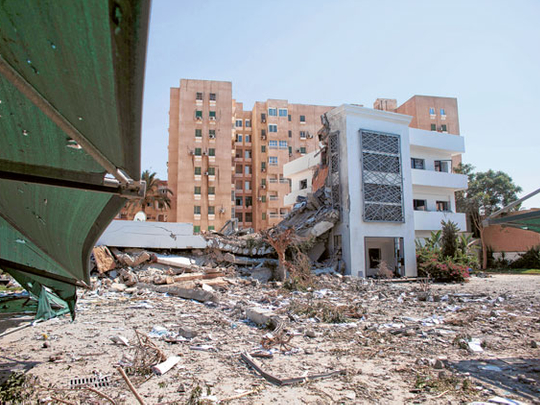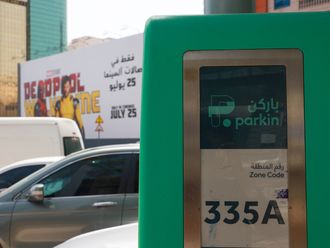
Tripoli: UAE companies want to move fast to establish themselves in Libya before rivals from other Gulf states and the rest of the world pile into a country that has a lot of oil revenue.
The depressing tawdriness of four decades of neglect under former dictator Muammar Gaddafi's rule is all too obvious in Libya's capital Tripoli. The roads are deeply pot-holed, most buildings are shabby and heavy concrete slabs betray their 1970s architecture, while large piles of rubbish mount up all around them.
But the miserable state of the country is also a huge business opportunity. "It might look grim, but there is so much to do. They need so much stuff," said the general manager of a family company in Abu Dhabi. He had flown into Tripoli as part of a 100-strong delegation of leading UAE companies and government officials, which used the inaugural flight of Etihad Airways to Tripoli as a reason to check out the new market.
The Emirati visitors all spoke of the need to move quickly to set up their businesses in Libya, despite the legal vacuum they would be moving into. They were well aware that the present interim government will draft some initial codes of conduct, which may then be replaced by the final elected government drafting new business laws, but the commercial reality is that they need to be on the ground as soon as possible.
Speed is critical
"Speed is important," Abdul Aziz Al Ghurair told Gulf News. "For any investor coming from the UAE, speed is critical. He has to choose where to invest because the whole world is going to be coming here.
"On the political situation in Libya, we are optimistic that life will stabilise. To reform a whole country will take some time, even a few years. It cannot be done in a few months. There is no trade agreement yet and that will take some time, but we sense a lot of goodwill from people in Libya."
Many businessmen on the delegation wanted a trade agreement between the UAE and Libya, so that the legal implications of doing business between the two countries would become easier. But looking ahead, others spoke of their hopes that they would be allowed to set up companies in Libya without local partners.
The Al Ghurair Group is well ahead of its rivals. "We have invested in the largest refinery in Libya, where we have a 50 per cent ownership," Al Ghurair told Gulf News. "We have come to expand our business, and plan to put in $1.5 billion [Dh5.5 billion] over four years."
The initial investment was made three years ago in the Ras Lanuf refinery, and is a partnership with the Libyan National Oil Company. This structure has the advantage that it is transparent, so that despite the drama of the change of regime, the investment has continued.
But the Al Ghurair Group is also looking at contracting, banking and insurance in Libya. "There is a lot to do, and therefore a lot of opportunities," Al Ghurair told Gulf News.
Looking around
Other companies in the delegation were going to Libya to start looking around. The manager of one Dubai family group was clear that bidding for any big infrastructure project would still be six months away from now.
"Companies are looking at starting with commercial options first. We have some spare capacity in Dubai thanks to the downturn, and we can put the stuff on a ship and do a deal. It will get our brand up in the town and we can look around.
"In addition to the senior managers, I am taking my logistics man since that will be a key part of getting things right in this market. And someone from administration, to understand how to manage the paperwork for imports and visas."
Along with many companies on the delegation, he was anxious to know what legal structures would be allowed. "There are lots of questions: in the absence of a trade agreement. For example: Can we go in as a sole trader, or do we need a local partner?
"And if we have to find a 51 per cent partner, then we need to find a family that we trust. Also, it is not clear if we should go with a Tripoli partner, or one in Benghazi."
But these challenges were all accepted as a normal part of getting to know a new market, and were not going to stop the businessmen looking for opportunities. One UAE company had already confirmed interest in Libya from a lot of the principals it already represents in the UAE.
"They know us, and they have no access to Libya at present. All the previous agreements in Libya were with the previous regime, and had Gaddafi-linked partners, so the field is completely open for new arrangements," he said.
Agriculture
The well-ordered green fields around Tripoli were in stark contrast to the rambling chaos of the city. One Abu Dhabi-based businessman came to a rapid conclusion that he would start by looking at how to support the obviously successful small holders, producing a lot of fruit and vegetables. "We should look at what the farmers might need, but we also need to see how we can get in on the distribution of their produce," as he thought of both the Gulf and European markets.
One small sector has already done very well this season. Unusually heavy rains in October and Nov-ember have resulted in a bumper crop of the local truffles, leading to a glut in the market. "Truffles are not common so a kilo is normally around 100 dinars [Dh300.5]," explained my gourmet taxi driver. "But now there are so much on the market that the price has fallen to between 25 to 50 dinars depending on the quality." Maybe a luxury product waiting to be exploited by a quick witted trader?
Tripoli seeks to be regional hub
Tripoli: Strategically, Libya sees itself as a regional hub between the Arab world, Africa and Europe, and the new authorities are anxious to build long-term relationships that will help them fulfil this aim.
Dr Yousuf Al Wahaishi, the Minister of Transport in the interim government, said that part of this regional strategy was that Tripoli airport is being rebuilt with a focus on working as a hub airport, carrying passengers and goods through Libya, rather than as a destination in its own right.
"Work on Tripoli International Airport has stopped, but will restart within a few months," he said. "And we will have an open skies policy when we get going."
Long-term operators
He also welcomed the UAE's acknowledged skills in managing ports, commenting that several of Libya's ports like Misrata and Benghazi needed major restoration after the impact of the recent fighting.
But they also will need long-term operators. "We will start to look for strategic partnerships that will operate for 10 to 15 years. The full details may have to wait for the new elected government, but they should not have to start completely from scratch. We need to see what we can do now," he said.












